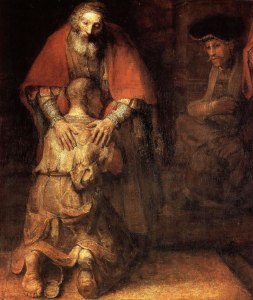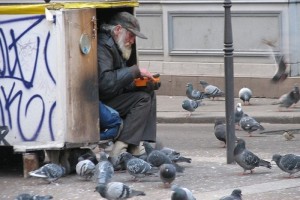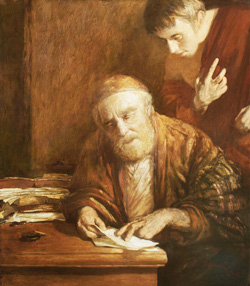And he said, “There was a man who had two sons . . .” Luke 15:11
The evening thickens as the day’s yellow sun slides into the horizon and balances there for a long moment, its rounded edge slowly melting into the hills. How many days have passed since this story was first told, how many ears have heard it since? And how many lost sons, on the dusty road or snug at home, have come to themselves under its quiet steady gaze? It’s been a long time, and many tellings, but let’s try to hear it as the first listeners might have. If they have been with him a while, they know the slightly higher, quicker pitch of his voice as it slides in to one of his stories. The disciples lean in, the villagers lean out, and the way each one hears reveals more about the person than he or she might care to show:
. . . The younger of them said to his father, “Father, give me a share of the estate I have coming to me.”
–What? You mean before the old man is even dead? That’s bold. Wonder if I would have the nerve to . . .
–Disgraceful! What kind of son would make such a request? The father ought to–
So he distributed the assets to them.
–?!?!?!?
–Shocking! What kind of father would agree to such a request? The other son ought to—
Not many days later, the younger son gathered together all he had, and traveled to a distant country, where he squandered his estate in foolish living.
–Of course he did. Brainless twit.
–What would I do with a fortune? Go someplace where no one knew me and . . . invest it? Probably intend to. But if there’s a party that night, and new friends to impress, and women . . .
–I know that type. Fresh faces off the farm, burning to stuff a year’s worth of iniquity into a single night, and pretend they’re the first to conquer me . . .
–Hm. If I got the other half of that inheritance, I’d put it in the bank and start looking for a nice piece of property. But I know what’s going to happen to this fool . . .
After he had spent everything, a severe famine struck that country, and he had nothing.
–Right.
He went to work for one of the citizens of that country, who sent him into his field to fed the pigs.
–Ew! Filthy, disgusting creatures—and yet too good for him.
He longed to gobble up the dry pods the pigs were eating, but no one would give him even that.
–Ha. Just what he deserves.
When he came to his senses, he said, “How many of my father’s hired hands have more than enough food, and here I am dying of hunger! I’ll get up, go to my father and say to him, ‘Father, I have sinned against heaven and in your sight. I’m no longer worthy to be called your son. Make me one of your hired hands.’”
–A nice little speech. But it’s just words.
–What if I told my father something like that? How would he take it, especially if I meant it? Would I mean it?
–Poor silly boy. But he’s hurt the old man deeply—slapped him in the face. I don’t know if I could ever forgive that.
So he got up and went to his father.
–Oh yes, and it seems to me dear old Abba has some repenting to do as well. The boy isn’t the only foolish one in this story . . .
But while the son was still a long way off, his father saw him and was filled with compassion. He ran—
–?!?!?!?!?
–threw his arms around his neck, and kissed him.
–What! He ran, the old fool?! The soft-headed, muddle-brained, sentimental—
–Filled with compassion. Filled with compassion. Compassion. As a father pities his children, so the Lord pities those who fear him, for he knows their frame, that they are dust. Compassion, compassion . . .
–Can it be?
–Wait. What father is like this?

The son said to him (between the kisses), “Father, I have sinned against heaven and in your sight. I am no longer worthy to be called your–”
“Quick!” his father called to the servants. “Bring out the best robe and put it on him; put a ring on his finger and sandals on his poor bleeding feet. Then bring the fattened calf and slaughter it, and let’s celebrate with a feast, because this son of mine was dead and is alive again; he was lost and is found!” So they began to celebrate.
–Oh, I get it. The father is the real fool. Like father, like son; I see it now. The old man will get his lesson too. Maybe from the other son—we haven’t heard from him yet . . .
–Insanity! So wrong! The boy must pay, or justice flies right out the window!
–Too much, too much. No father behaves this way. If only mine would . . .
–I’m totally lost.
–I’m lost. Yes, that’s me. Can I be found?
Now, his older brother was in the field . . .
–Aha! I knew he’d make an appearance. Now we’ll hear some good sense.
. . . as he came near the house he heard music and dancing. So he summoned one of the servants and asked what these things meant. “Your brother is here,” he told him, “and your father has slaughtered the fattened calf because he has him back safe and sound.”
–Boiling. I’m just boiling. To come in from the field after working all day in the hot sun, to find everyone else has been putting together a party—to welcome my lazy, disrespectful, ungrateful, frivolous—
Then he became angry and didn’t want to go in.
–Quite right, too. Anyone would be. Now we’ll see justice done.
So his father came out and pleaded with him.
–Seems to me this dotty old man should apologize to him.
–But . . . it’s the father’s house and property, after all. Can’t he do wait he wants with his own stuff? Does the brother really have a right to be angry? He sounds a little like Cain. Only, of course, his little brother is no Abel . . .
–Pleaded with him. Pleaded with him. What father is like this?
But he replied to his father, “Look, old man–”
–Ooh. Not very respectful is he? Well, chalk it up to righteous anger.
“I have been slaving for you all these years, and I have never disobeyed your orders . . .
–Exactly. Obedient. Blameless.
–Orders? It’s a family, not a military camp.
. . . yet you never gave me so much as a young goat so I could celebrate with my friends.
–Did he ever ask? I wonder.
–Wait a minute: is this envy? You’re supposed to speaking up for righteousness, young scion. It’s not all about you.
“But when this son of yours came . . .”
–Er, your brother too. Part of the family and all. I wonder if the good boy had a part in making the bad boy what he was?
“. . . who has devoured your assets with prostitutes . . .”
–Yes! Drive it home!
“. . . you slaughtered the calf for him.”
–Your turn, old man. Too proud to apologize?
“Son,” he said to him, “you are always with me, and everything I have is yours.”
–Oh. Well, I guess that’s true.
“But we had to celebrate, because this brother of yours was dead, and is alive again. He was lost and is found”
* * * * * * * * * * *
It’s almost dark now. The Master’s voice falls silent.
–Is . . . is that all?
–How does it end? Does the elder brother go in and enjoy the party? Has the younger brother really learned his lesson? What about the inheritance he spent—will there be anything left for him?
–Well, that’s . . . I must say, that’s the most unsatisfying story I ever heard. Who won? You’d almost think both brothers are equally lost. But that can’t be.
The Pharisees and scribes are the first to take their leave, gathering their robes and tassels about them and nodding briefly to the teacher, who nods back. Then the women round up their little ones, and the householders with livestock head for the fields to see that their sheep are safely folded. Last of all, old Simon the sot and young Amos the fool and the good-time girls, Rachel and Joanna. Before she goes, Rachel impulsively grabs the Master’s hand.
“Is there such a father?” she asks him. “Would he take me—would he take someone back who had hurt him so badly? My own father barely noticed if I came or went, until the day I left for good. Is there a father who watches for me? I need to know, because–”
The light pressure on her wrist stops her, reminds her she can’t make excuses. “Ask him,” Jesus says. “Use my name.”
She knows who he’s talking about, and is filled with an inexpressible hope.
_________________________________________
for the first post in this series, go here.
<Previous
Next>



